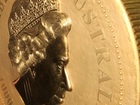While other national leaders play golf or ride horses to relax, Indonesian President Susilo Bambang Yudhoyono says he composes songs.
One of his compositions -- on the environment -- was played just before he spoke to business leaders on Saturday on the sidelines of the Asia-Pacific Economic Cooperation (APEC) summit in Honolulu, Hawaii.
 Full Story
Full Story
Water fowl, monitor lizards and stray dogs have replaced the throngs of tourists at one of Thailand's greatest historical sites. Record flooding has turned Ayutthaya's ancient temples into islands, and a giant statue of the reclining Buddha appears to float miraculously on the lapping water.
Experts fear that at least half of the more than 200 waterlogged monasteries, fortresses and other monuments in the one-time royal capital have been damaged.
 Full Story
Full Story
An illustrated book describing Canada's vast wilds, masked medicine men and a missionary's taming of bears at the onset of European colonization will hit bookstores on Saturday -- three centuries after it was written.
The manuscript titled "The Natural History of the New World" and a separate codex of drawings was penned around 1675 by a fantastically imaginative Jesuit priest named Louis Nicolas.
 Full Story
Full Story
Two Syrian theater actors known for their plays mocking authority headed to Egypt on Thursday, fleeing possible arrest in their country but vowing to pursue their pro-democracy struggle.
Mohammed and Ahmed Malas, 29-year-old twin brothers, left to Cairo from Beirut, where they had been living in hiding for the past month.
 Full Story
Full Story
Russian soldiers in Soviet uniforms paraded across Red Square Monday to mark 70 years after Soviet troops marched through the square directly to fight the German Wehrmacht on the fringe of Moscow.
Tanks, cadets and troops paraded through the square in front of veterans who were among the thousands of soldiers who marched straight to war on November 7, 1941 in a show of force during one of the darkest hours for the USSR in World War II.
 Full Story
Full Story
An ancient ritual worshipping Kanchenjunga, the world's third-highest mountain, has ended with the death of the last Lepcha priest in remote northeast India, reports said Sunday.
The indigenous Lepcha people of Sikkim paid homage to the Himalayan peak for hundreds of years in an annual ceremony led by direct descendants of the original "bongthing" or priest.
 Full Story
Full Story
The glitz and glamour of Miss World returns to its British home to celebrate the global beauty contest's 60th birthday on Sunday, with a billion viewers expected across the planet.
A record 122 beauty queens from Albania to Zimbabwe are taking part in the pageant, which will be broadcast live to more than 150 countries.
 Full Story
Full Story
A nude Paralympic cyclist, an abstract take on Big Ben and two birds kissing.
Olympic officials on Friday unveiled the posters for the London 2012 games, which highlight 12 different takes on how to celebrate the Olympic and Paralympic games.
 Full Story
Full Story
A large gold coin which had displaced an Australian coin as the world's biggest, but recently lost the title, was on display this week in Canada's largest city.
The coin, measuring 50 centimeters across, took over two years to make from design to final product. When it was introduced in 2007 by the Royal Canadian Mint, it set a Guinness World Record.
 Full Story
Full Story
Cultural events will take over Scottish castles, ancient English monuments and every corner of London as part of a giant arts festival running in conjunction with the 2012 Olympics.
The lineup for the 12-week London 2012 Festival, announced by organizers Friday, ranges from pop-up William Shakespeare to vintage Alfred Hitchcock, and includes artists, musicians, writers and performers from Britain and around the world.
 Full Story
Full Story



